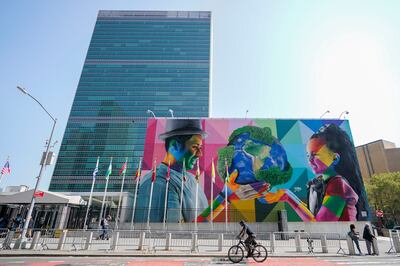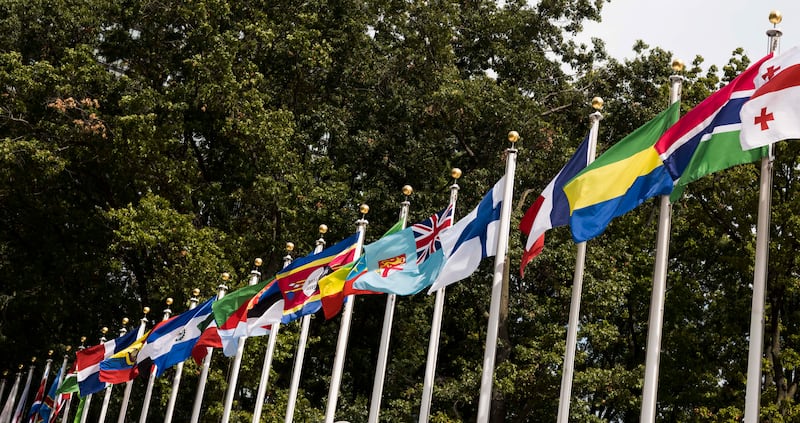Cop27, the global climate change conference, offers a unique moment for leaders from across the world to build pathways for a more resilient and sustainable agenda that places climate change at the forefront of future economic prosperity; with particular opportunities for emerging markets.
Many of those gathering this week at the UN General Assembly and at the World Economic Forum’s Sustainable Development Impact Meetings will also attend Cop27. These leaders would do well to keep the thoughts below in mind.
Cop27 is widely seen as being the first “Cop of implementation”. In particular, there will be a strong global push for climate finance to help fill the funding gap for climate mitigation and adaptation projects in the Global South.

With six of the previous 10 climate change conferences having taken place in Europe, the hosting of this year’s in Egypt and Cop28 in the UAE in 2023 is an opportunity to hear more voices from often under-represented regions particularly badly impacted by climate change.
Actions aimed at cutting emissions will never be successful unless emerging economies and people at all levels of society are involved in shaping the agenda and seeing its benefits first-hand.
Since the signing of the Paris Agreement in 2015, advanced economies have pledged $100 billion towards climate solutions and the signing of the Glasgow Climate Pact at last year’s Cop26 firmed up the global agreement to accelerate action this decade. In Sharm El Sheikh, they will be held to account in making good these commitments.
But action on climate change cannot be taken by governments alone. The private sector will play a vital role in helping countries across the world meet their nationally determined contributions (NDCs) on reducing emissions and adapting to the impact of climate change.
On a positive note, November’s Cop27 meeting comes amid unprecedented momentum and participation from businesses in taking climate action, thereby also providing a unique moment to unlock the public-private co-operation required for reducing carbon emissions and tackling pollution.
And there are already many examples of such partnerships successfully driving action on climate change.
The World Economic Forum’s First Movers Coalition (comprising companies in hard-to-abate sectors) launched just last autumn at Cop26. There, partners showcased the first-ever piece of fossil-free steel. Since then, the first-ever truck made with this steel has rolled out of the factory and other partners have made progress toward their decarbonisation commitments for everything from aviation to aluminium. The World Economic Forum launched the Alliance of CEO Climate Leaders India as a high-level platform of business leaders across industries that aims to turn ambition on climate change into action through concrete plans that leverage multi stakeholder partnerships, private sector leadership and collective action.
In Africa, the Global Plastic Action Partnership (GPAP) sees the Forum work with governments in Ghana, Nigeria and South Africa on combating plastic pollution. Ghana, for example, is working to achieve zero plastic leakage into its oceans and waterways.

Cop26 ended with a commitment by richer nations to provide low and middle income countries with $40bn a year in adaptation finance to help communities protect themselves from the impact of climate change from 2025. So we can also expect the Egyptian presidency to put an equal emphasis on adaptation, such as food and water security, as well as climate mitigation measures, such as the energy transition.
Food and water security is especially relevant to the Middle East and North Africa region, which is warming at twice the global average and is particularly vulnerable to extreme weather events.
As the war in Ukraine continues to disrupt global food supply chains and droughts in the region harm the local agricultural yields, we could see the serious impacts of food insecurity.
Leaders for a Sustainable Mena, a high-level community of public and private sector leaders committed to scaling the roll-out of low-carbon technologies and infrastructure in the region, have identified three priority areas of climate action: mobilising a just and inclusive energy transition, driving resilient food and water systems, and unlocking innovation for a greener built environment.
However, they stress that filling the financing gap and raising the corporate ambition for net zero targets will be vital to address these priority areas.
Speaking ahead of the upcoming climate meeting, Egyptian President Abdel Fattah El Sisi said: “I deeply believe that Cop27 is an opportunity to showcase unity against an existential threat that we can only overcome through concerted action and effective implementation.”
We at the Forum agree that through public-private co-operation, we can build a better, cleaner and more sustainable world for everyone. Cop27 is an ideal opportunity to build partnerships, and we need to take advantage of it.






